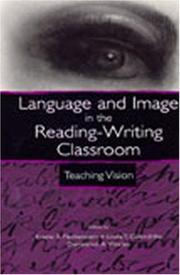| Listing 1 - 1 of 1 |
Sort by
|

ISBN: 058539525X 9780585395258 1410602435 9781410602435 9780805839401 0805839402 9780805839418 0805839410 0805839402 0805839410 1282324314 9781282324312 9786612324314 6612324317 1135644861 9781135644864 9781135644819 9781135644857 Year: 2002 Publisher: Mahwah, N.J. Lawrence Erlbaum Associates
Abstract | Keywords | Export | Availability | Bookmark
 Loading...
Loading...Choose an application
- Reference Manager
- EndNote
- RefWorks (Direct export to RefWorks)
This volume offers concrete answers to the question of how we can use imagery to enrich the teaching of reading and writing. The chapters are organized according to two guiding principles. First, each addresses specific aspects of the inextricable integration of imagery and language in the teaching of reading and writing. Imagery is not privileged over language; the fusion of the two is emphasized. Second, each focuses on a particular kind of imagery--mental, graphic, or verbal--describing teaching/learning strategies based on the deployment of that kind of imagery in the classroom. There is currently a renewed acknowledgment of the importance of imagery in meaning. The rapid spread of the World Wide Web, computer interfacing, and virtual reality further highlights the need to attend to the influence of imagery in a networked world. In response to these shifts in scholarly and cultural perspectives, NCTE has established a committee on visual literacy, and an emphasis on visual literacy has been incorporated into the IRA/NCTE Standards for the English Language Arts. This book contributes significantly toward filling the need for explicit and specific theory-based methods teachers can use to integrate imagery into their pedagogy. Accessible and lively chapters include classroom activities and student-generated examples. Language and Image in the Reading-Writing Classroom is an excellent text for preservice and in-service pedagogy courses and an important resource for practicing teachers, researchers, and professionals in the field.
Language arts. --- Imagery (Psychology) in children. --- Child psychology --- Cognition in children --- Communication arts --- Language arts --- Communication --- Study and teaching
| Listing 1 - 1 of 1 |
Sort by
|

 Search
Search Feedback
Feedback About UniCat
About UniCat  Help
Help News
News